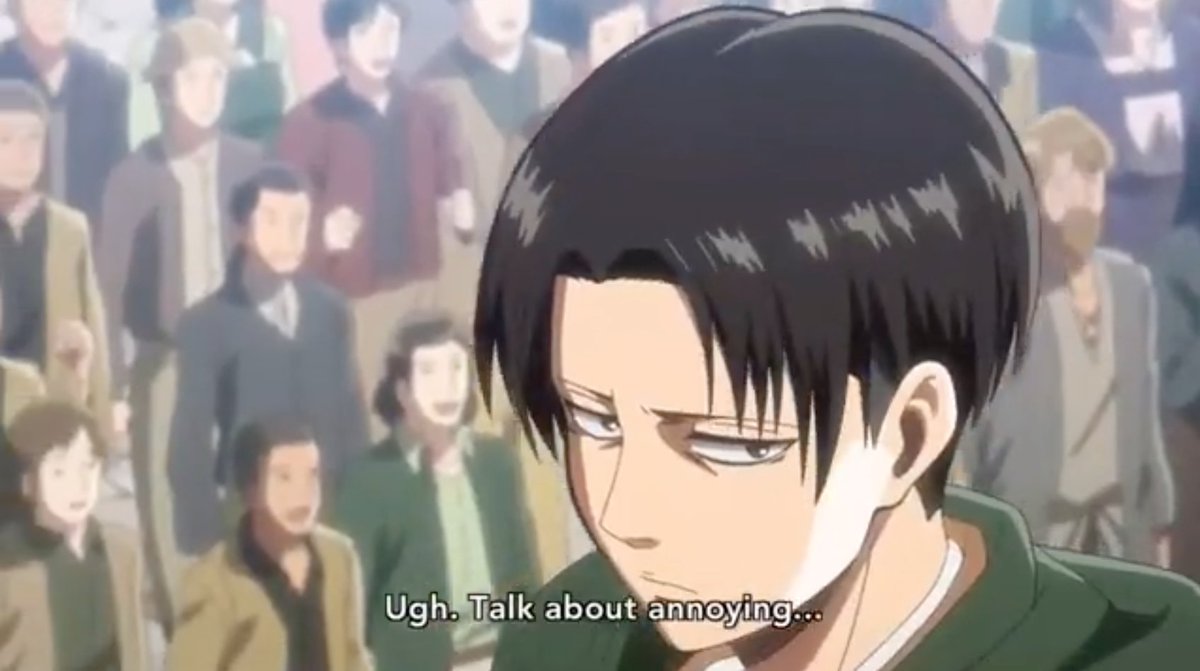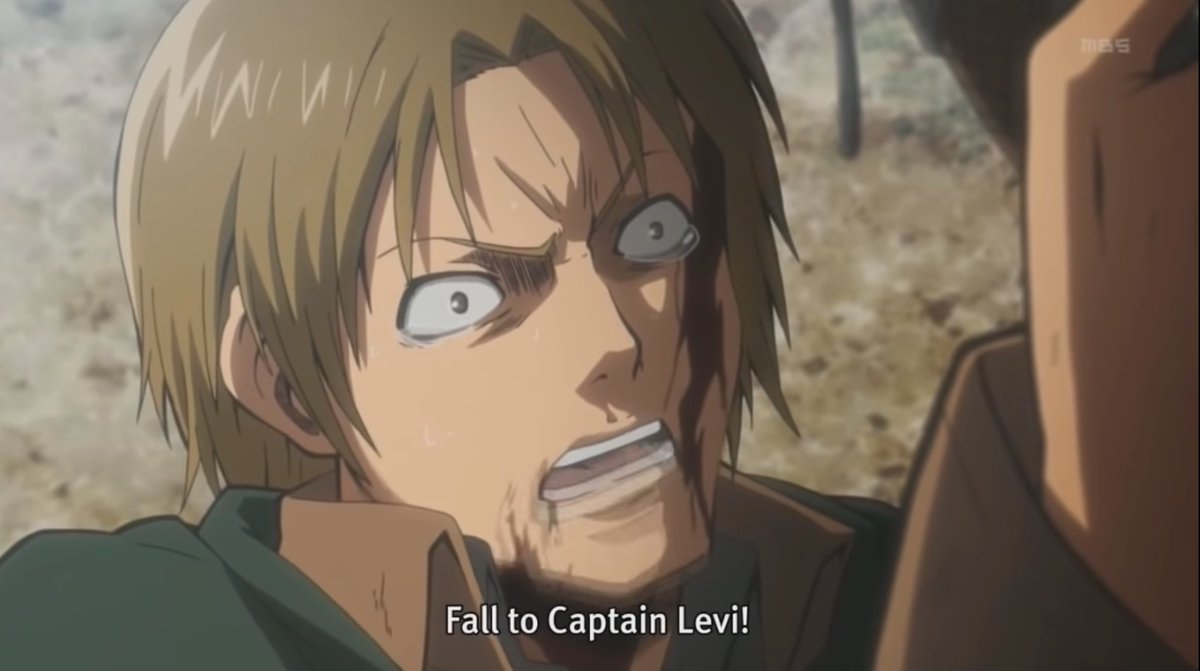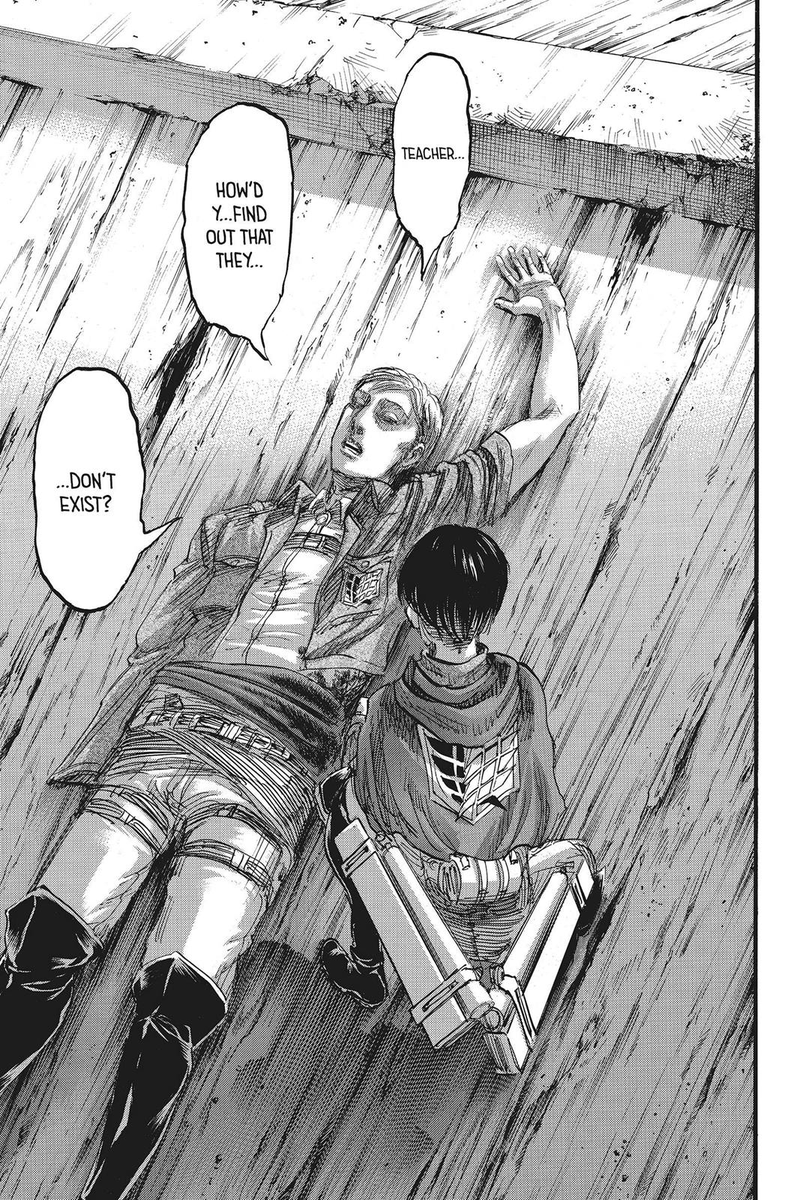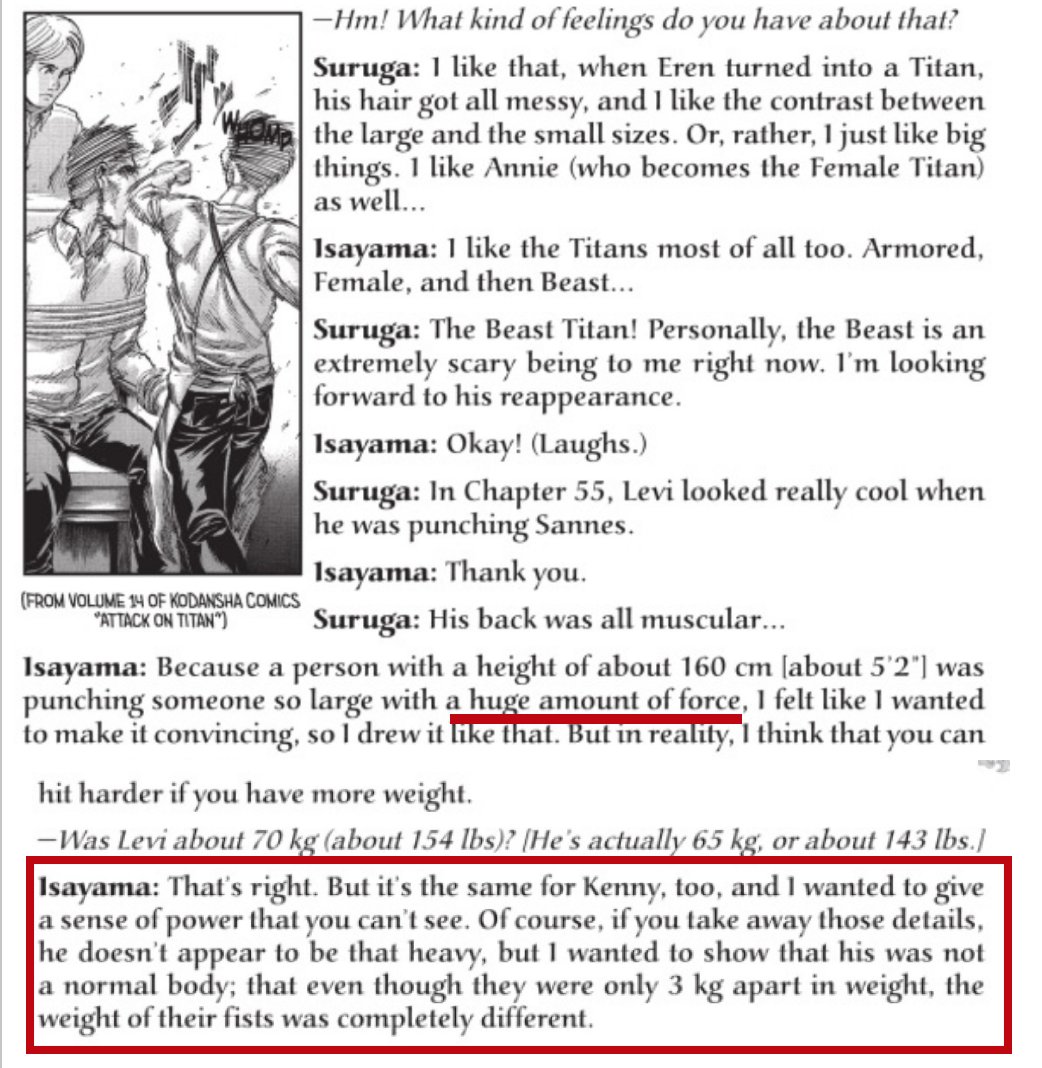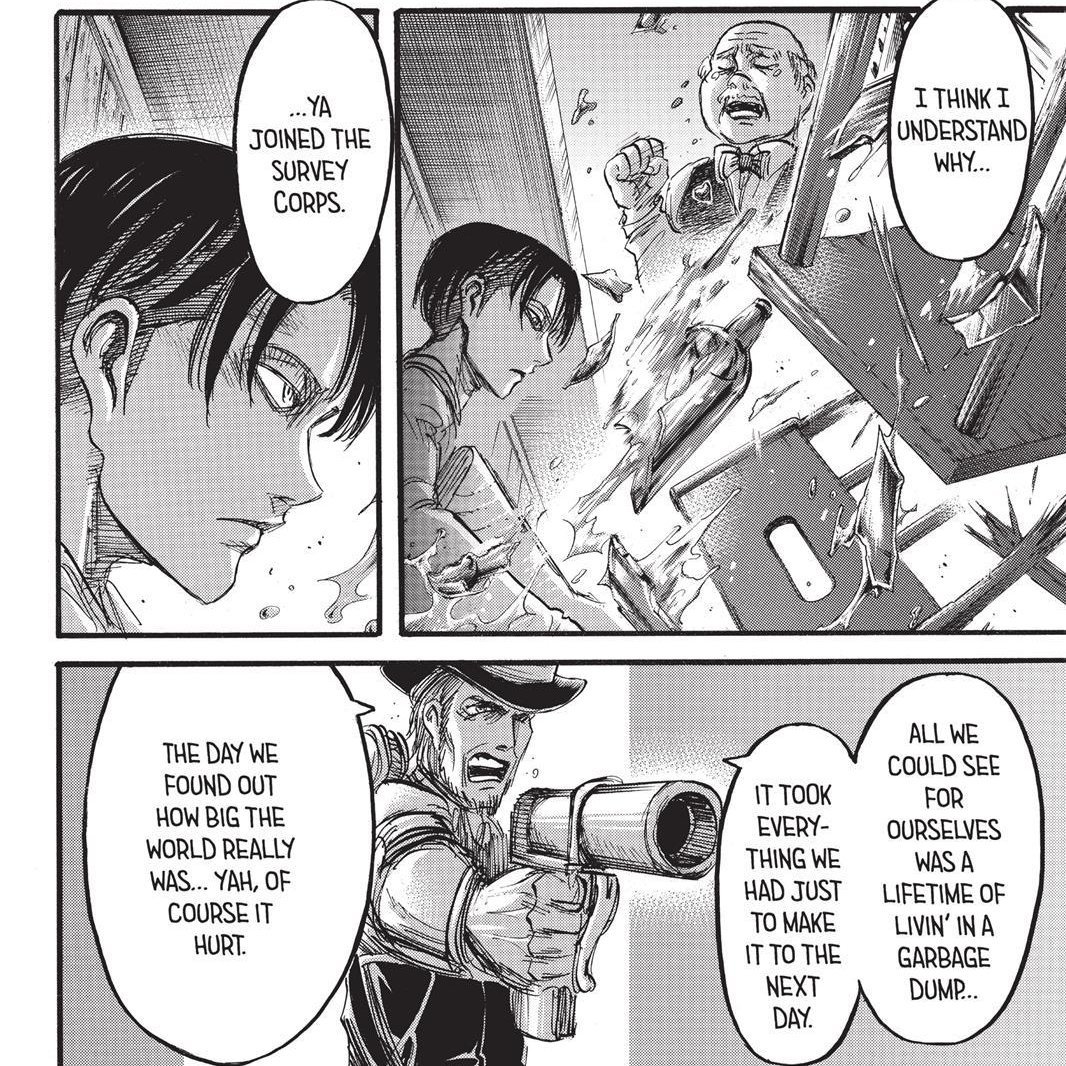Levi Ackerman: Living For the Fallen
Thread analyzing Levi's core character motivation of finding meaning in the sacrifices of the fallen Survey Corps members and how it ties his entire arc together, from his introduction to the final chapter
#aotmangaspoilers
Thread analyzing Levi's core character motivation of finding meaning in the sacrifices of the fallen Survey Corps members and how it ties his entire arc together, from his introduction to the final chapter
#aotmangaspoilers

Levi's intro is crucial to understanding his character- we immediately learn what matters to him, how he lives with all the death surrounding him, and how he chooses to live his life.
This character motivation established in his intro permeates his story & culminates in his end



This character motivation established in his intro permeates his story & culminates in his end




His Intro: "Captain Levi"
First, we see Levi go to save a nameless comrade who finds hope in Levi's strength- this soldier in the face of death explicitly ties humanity's survival to Levi's existence, with emphasis on his teary-eyed expression looking to Levi as he swoops in

First, we see Levi go to save a nameless comrade who finds hope in Levi's strength- this soldier in the face of death explicitly ties humanity's survival to Levi's existence, with emphasis on his teary-eyed expression looking to Levi as he swoops in
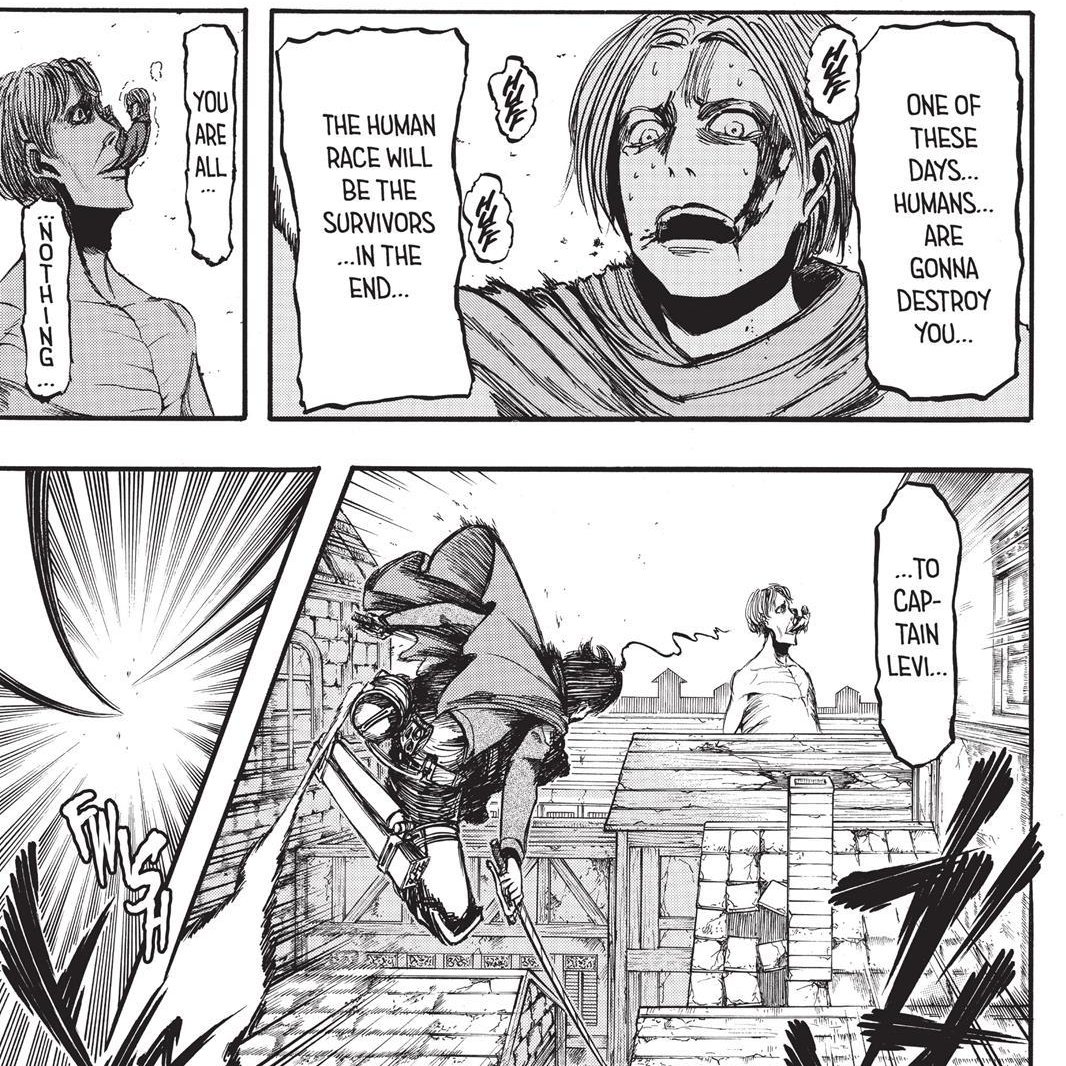

Then emphasis is given to Levi caring about his fate, telling Petra to go care for him and anyone else, while Levi tasks himself with fighting the majority of other titans, carrying on the soldier's fight 

But it's not enough, as Levi finishes up killing the titans and follows up on the soldier, it's clear Levi wasn't able to save him and he'll die.
In his final moments, he looks to Levi for reassurance that his life will have meaning and Levi kneels beside him and shares his POV
In his final moments, he looks to Levi for reassurance that his life will have meaning and Levi kneels beside him and shares his POV

No Regrets & His Role in the Scouts
Levi famously lives by a code of living with his choices and not dwelling on what-could-have-beens.
He recognizes the need to accept the past as it can't change and focus instead on the future, which Levi can still impact as he lives on.
Levi famously lives by a code of living with his choices and not dwelling on what-could-have-beens.
He recognizes the need to accept the past as it can't change and focus instead on the future, which Levi can still impact as he lives on.

While all three vets are motivated by the sacrifices, Levi is subtly different from the other two. It's why Levi calls out that Hange sounds like Erwin; he listens to both Erwin and Hange's concern about what the others' would think if they were there but doesn't really share it 



While Levi questions what it was all for and sets an impossibly high standard for himself with no tolerance for "failure", he doesn't worry if his choices were right. His mindset is that "no one could know the outcome" so he makes the choices he'd least regret and lives with them 

How he lives with his choices is this mentality that as long as he lives, fights on, never gives up, literally takes up the will of the fallen, their lives will live on, too
It's what he says in his intro to the nameless soldier: even after death, they'll "do more" through him
It's what he says in his intro to the nameless soldier: even after death, they'll "do more" through him

This difference from Hange & Erwin is primarily driven by their different roles- as Commander, lit. "leader of the delegation", Hange & Erwin must be the face & set the direction. They have to lead the org
https://twitter.com/whofavoredfire/status/1539202727875448832
However, as "Humanity's Strongest" & "heishichou", lit. "leader of the soldiers", Levi's role is to more execute on that vision rather than set the strategy
That's how the nameless soldier saw him: hope to carry on the mission; it's also how Levi sees himself due to his strength


That's how the nameless soldier saw him: hope to carry on the mission; it's also how Levi sees himself due to his strength
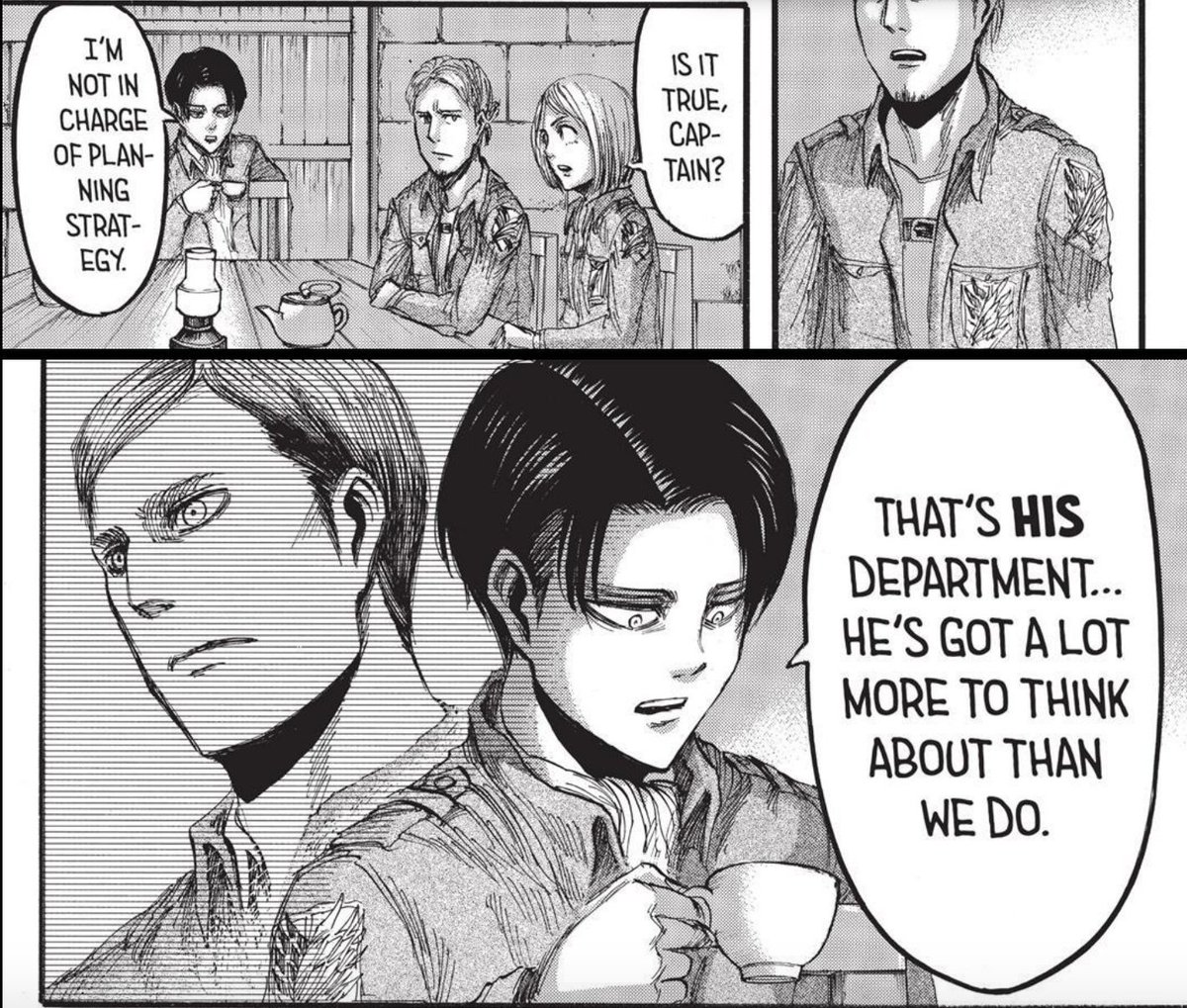


Levi carries within him the burden of carrying on the will they all shared, that idealistic hope of a world without titans, to derive meaning from all the death - sacrifices he feels so responsible for that he literally views them as having "killed" their comrades: 

Finding Meaning
As a result of this way he lives, Levi's constantly searching and fighting for meaning of all the tragedy, tying the past to (his) current actions multiple times. This is especially emphasized in the final arcs
An example is his vow to Erwin to kill Zeke -
As a result of this way he lives, Levi's constantly searching and fighting for meaning of all the tragedy, tying the past to (his) current actions multiple times. This is especially emphasized in the final arcs
An example is his vow to Erwin to kill Zeke -
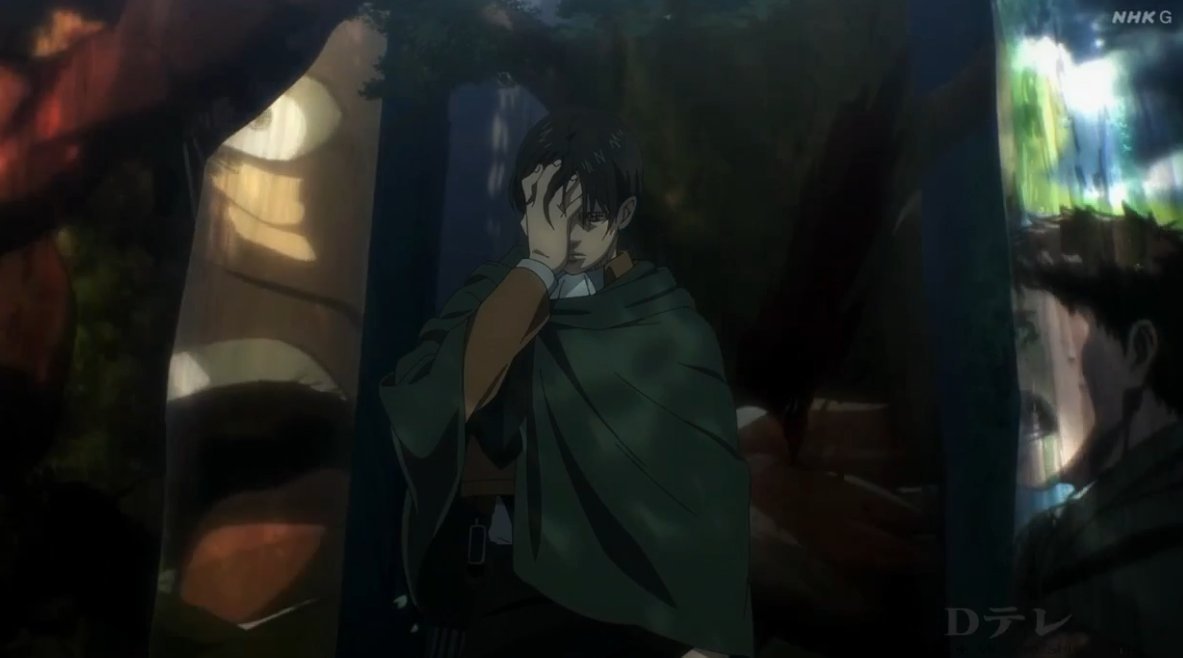
If Levi ensures Paradis takes the Beast Titan & Zeke can't kill more, then for him, that retroactively brings meaning to Erwin & the others' deaths despite the vow being made years ago & in different circumstances
To him, it's a way to prove meaning for otherwise wasted deaths
To him, it's a way to prove meaning for otherwise wasted deaths

Beyond just caring for him, this is also a big reason why Levi struggles so much with the idea of killing Eren- he views all he and others did to save Eren only to sacrifice him later as making a mockery of those who died
In 112, he basically has an existential crisis over that

In 112, he basically has an existential crisis over that


There's multiple layers going on for both things (the promise to Erwin and the decision to kill Eren) as well.
Like with Eren, Levi not only cares for him on a personal level but had viewed him as a source of hope; he struggles to reconcile Eren's choices and attitude with this



Like with Eren, Levi not only cares for him on a personal level but had viewed him as a source of hope; he struggles to reconcile Eren's choices and attitude with this




And his vow is his initial character motivation x1000-
It's not assumed responsibility as Humanity Strongest, Levi actually calls for Erwin & the recruits' deaths & fails them
Instead of a nameless comrade, he vows to Erwin, who he greatly cares for & sparked his life's mission



It's not assumed responsibility as Humanity Strongest, Levi actually calls for Erwin & the recruits' deaths & fails them
Instead of a nameless comrade, he vows to Erwin, who he greatly cares for & sparked his life's mission




Ultimately these desires (avoid sacrificing Eren, the vow) represent Levi's feelings of responsibility to find meaning for the sacrifices & unwillingness to let them be (to him) in vain
He ties them both together- plans to use Zeke's death to subvert the need to sacrifice Eren:


He ties them both together- plans to use Zeke's death to subvert the need to sacrifice Eren:

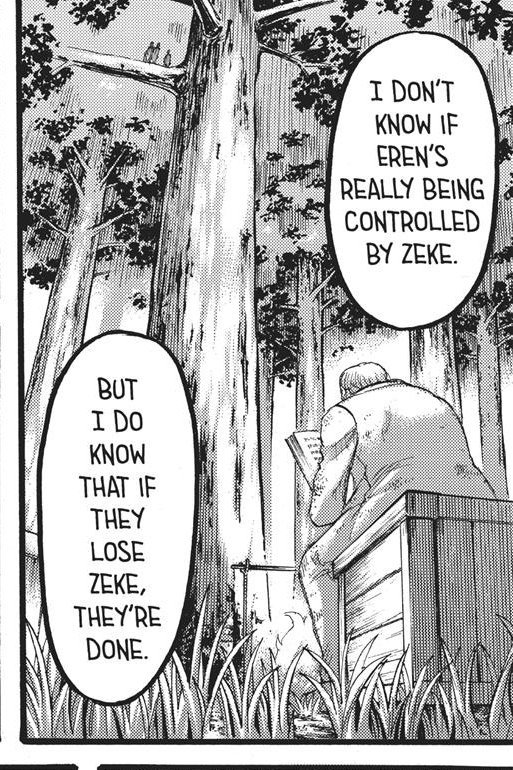
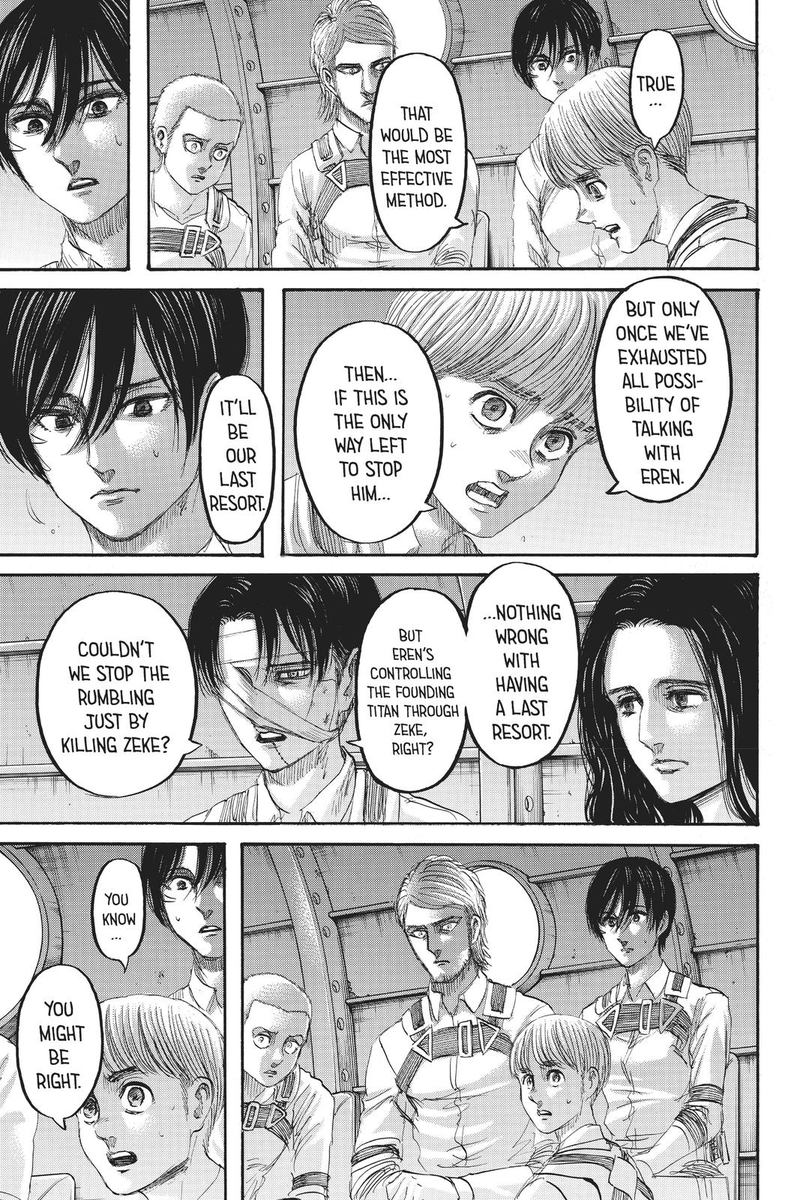
That's why when killing Zeke comes up, it's often tied to sparing Eren- even to Magath & Pieck where he says their "interests align" in wanting to kill Zeke (to stop the Rumbling)
Because where their interests don't align, as explored in 127 & 135, is in killing Eren to do so


Because where their interests don't align, as explored in 127 & 135, is in killing Eren to do so



All of this comes to a head in 136 where Levi has to face:
1. They have to kill Eren
2. They never were in a position to spare Eren
3. He supposedly can't fulfill his vow to Erwin
This is all framed under a blanket question of "what were all the sacrifices for then?" as a result



1. They have to kill Eren
2. They never were in a position to spare Eren
3. He supposedly can't fulfill his vow to Erwin
This is all framed under a blanket question of "what were all the sacrifices for then?" as a result




SNK Final Exhibition posed questions for some characters- Levi's was "is it hope or despair that his strength come from?"
Basically what's driving Levi on, giving him the strength to keep going despite it all
And like all the other questions posed, the answer is ultimately both
Basically what's driving Levi on, giving him the strength to keep going despite it all
And like all the other questions posed, the answer is ultimately both

Where does Levi's strength come from?
The despair of being the last one standing surrounded by constant losses and the hope to make those sacrifices meaningful through his own actions, justifying it all (both the immeasurable losses and his own survival throughout it)



The despair of being the last one standing surrounded by constant losses and the hope to make those sacrifices meaningful through his own actions, justifying it all (both the immeasurable losses and his own survival throughout it)
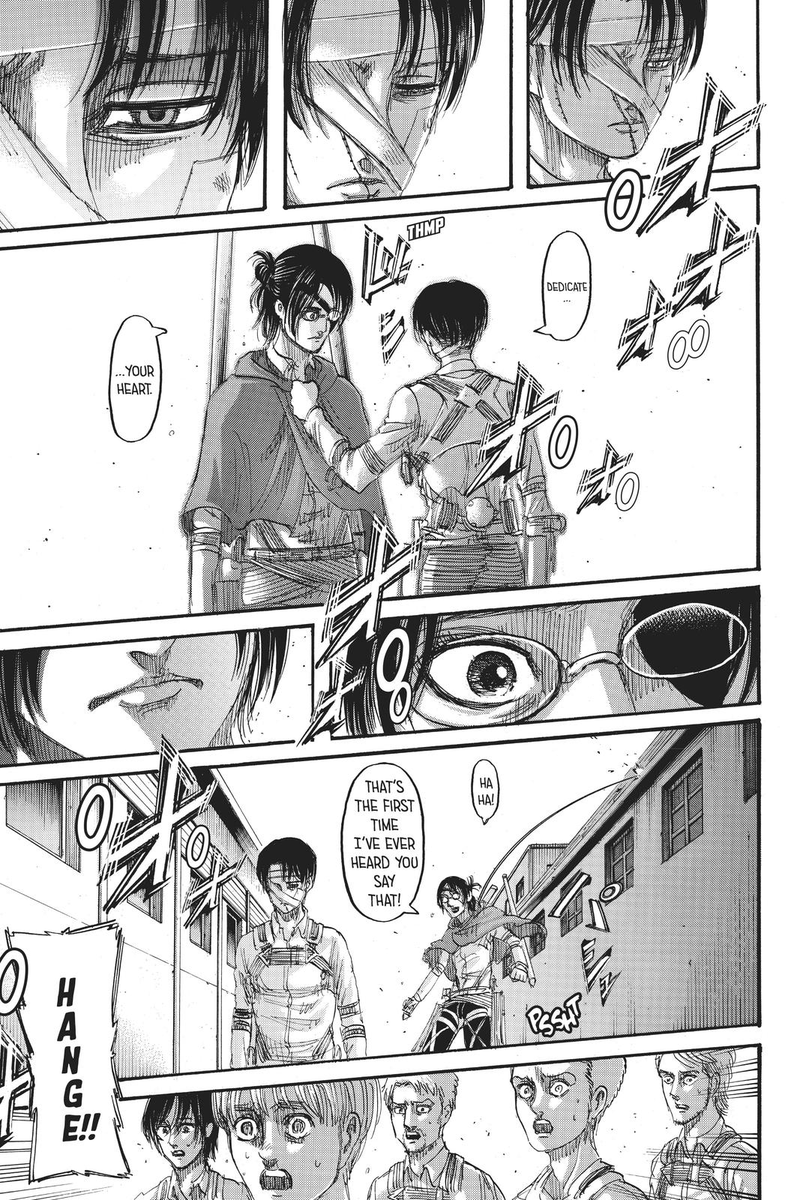
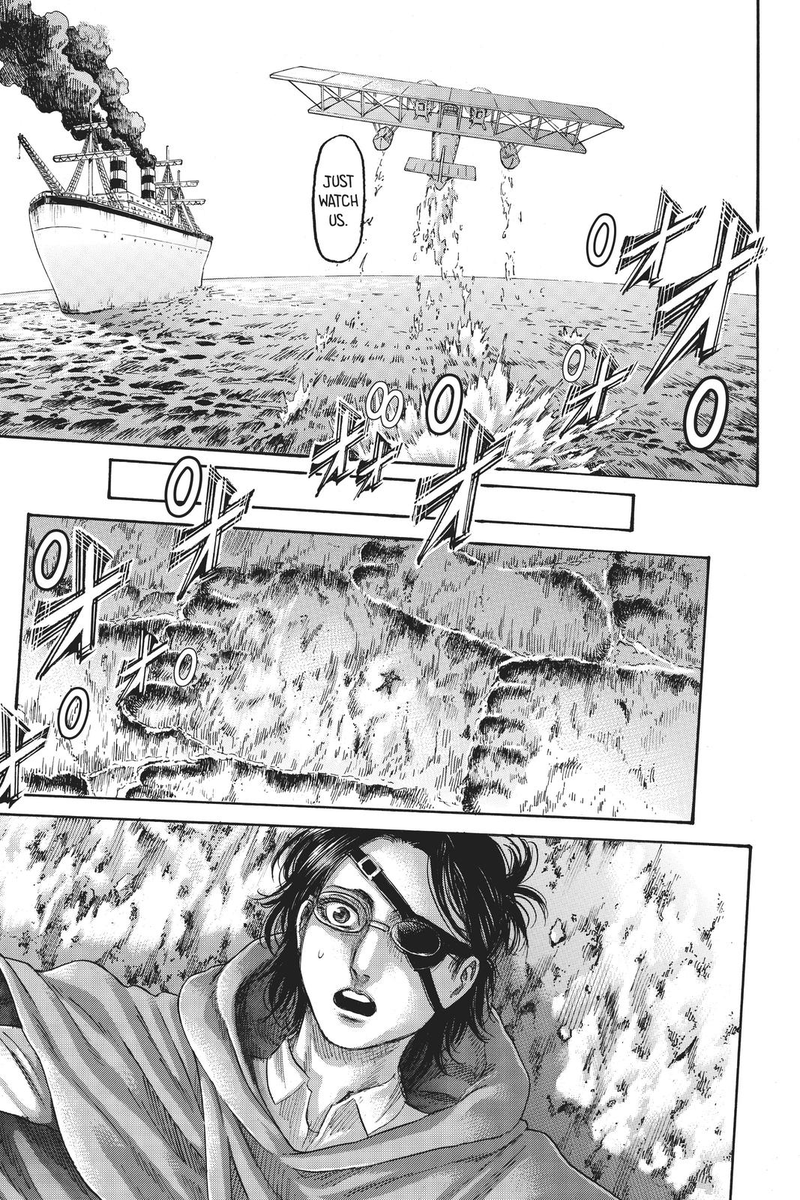


His Ending
All of this comes full circle in the final chapter(s).
Levi spurs on and supports Mikasa's choice, which ultimately leads to the end of the titan curse
Levi then once more ties his actions there and that result to what the others' dedicated their hearts and died for



All of this comes full circle in the final chapter(s).
Levi spurs on and supports Mikasa's choice, which ultimately leads to the end of the titan curse
Levi then once more ties his actions there and that result to what the others' dedicated their hearts and died for




AoT had multiple times tied living on as carrying the memories of those who had passed on, most notably with Mikasa & Eren (in Trost and the end)
If Mikasa dies, so does the memory of Eren's impact on her; she can't remember him if she's gone too, so she resolves to live



If Mikasa dies, so does the memory of Eren's impact on her; she can't remember him if she's gone too, so she resolves to live




Levi is the last one who could remember those who came before the 104th, carry their memory
So even his last panel, where he is experiencing the wall and titan-free life they all fought for, ties to this as he is carrying their dreams forward, still living for them in some ways
So even his last panel, where he is experiencing the wall and titan-free life they all fought for, ties to this as he is carrying their dreams forward, still living for them in some ways

• • •
Missing some Tweet in this thread? You can try to
force a refresh





